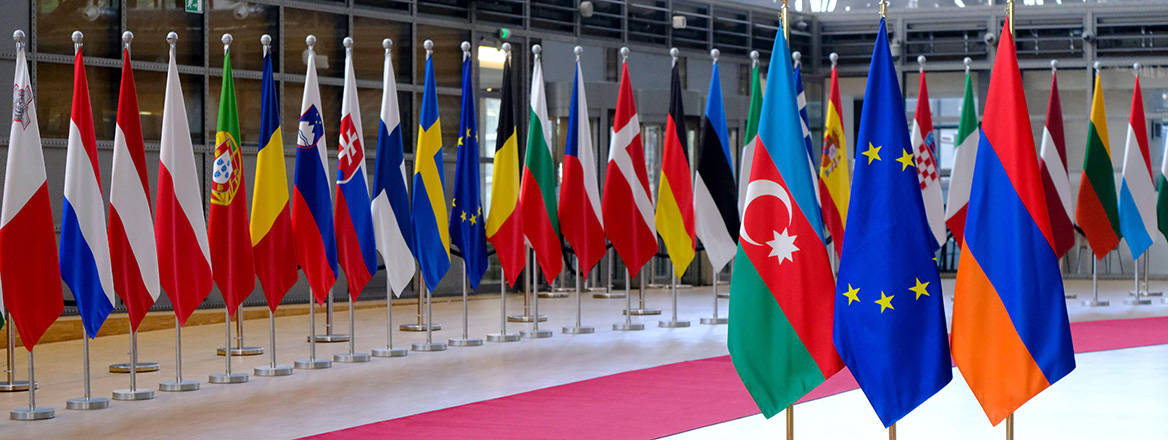Seizing the Moment: Western Opportunities Amid Change in the South Caucasus
Russia’s frostier relations with Armenia and Azerbaijan provide the West with an opportunity to intervene by counterbalancing Russia and fostering a beneficial regional peace.
The recent peace agreement between Armenia and Azerbaijan marks a potential end to decades of hostility and signals a significant geopolitical shift in the South Caucasus. For Armenians, the deal represents a painful reckoning, with the loss of Karabakh, a deepening refugee crisis, and growing domestic unrest ahead of elections. For Azerbaijan, it is a moment of restored territorial sovereignty and cautious optimism, though tempered by the ongoing threat posed by Russia.
Located at the crossroads of Europe, the Middle East, and Asia, the South Caucasus is a region of increasing geostrategic importance. The Middle Corridor, the shortest trade route between China and Europe, has year-on-year increased its trade flow since the 2022 full-scale invasion of Ukraine. Georgia, Armenia and Azerbaijan’s proximity to Russia and Iran make them invaluable potential partners to limit anti-Western interests.
Russia has historically dominated the region. However, with the bulk of state resources redirected towards Ukraine, Russia’s ability to influence the South Caucasus has diminished significantly. The West has maintained a limited role within the region but has struggled to improve its influence despite Russia’s weakened position.
Both countries now find themselves aligned in seeking to curb Russian influence and promote regional connectivity. Central to this effort is the Zangezur corridor, which, despite implementation disputes, promises a strategic transit route linking Azerbaijan directly to Türkiye, bolstering Ankara as a rising regional power. The U.S.'s successful acquisition of development rights to the corridor further reflects a broader opportunity for Western engagement in shaping a sustainable peace. Yet, this fragile accord faces serious risks. A sidelined Russia may resort to hybrid destabilisation tactics, while a weakened but defiant Iran remains a wildcard. Ensuring long-term stability will require sustained Western involvement to combat disinformation, rebuild trust, and support the region's post-conflict recovery.
This coordinated anti-Russian effort is a pivotal moment for the West to relaunch its efforts towards improving its influence within the region, counterbalancing Russian influence, and promoting a model of regional stability that aligns with Western interests.
Russia in the South Caucasus
Following the second Karabakh war and full-scale invasion of Ukraine, Russia’s regional influence has weakened, now maintaining influence through manipulating frozen conflicts, sowing domestic unrest and pursuing hybrid operations to destabilise incumbent national authorities.
Within the framework of the Collective Security Treaty Organisation (CSTO), Russia inserted itself as the main security guarantor between Armenia and Azerbaijan and leveraged its mediation role to station peacekeepers within Nagorno–Karabakh. These peacekeepers failed to prevent border skirmishes and were removed following an Azerbaijani military operation in September 2023.
Without suitable security and economic replacements, it will be difficult for Armenia and Azerbaijan to dislodge Russia
However, Russia continues to wield considerable economic leverage. As a member of the Eurasian Economic Union, Armenia has significantly expanded its trade with Russia since 2022 and remains Armenia’s primary source of energy and its largest trade partner. Meanwhile, Azerbaijan’s agricultural sector is heavily reliant on Russia as their largest non-oil export market, matched with a strong dependence on Russian grain and fertiliser.
While Russia’s political influence within the South Caucasus has diminished significantly within the last decade, it can still exert pressure on Armenia and Azerbaijan through its remaining leverage. Without suitable security and economic replacements, it will be difficult for Armenia and Azerbaijan to dislodge Russia.
Strains in Russia–Armenia Relations
Following the failure to respond to Armenia’s requests for military support during the second Karabakh war, Yerevan has attempted to distance itself from the Kremlin. Armenian Prime Minister Nikol Pashinyan has been critical of dominant Russian influence within Armenia, denouncing Russian security policy towards the wider region and freezing its participation within the CSTO. This has spurred Yerevan’s attempts to shift to alternative exporters of arms, and has prompted an interest in greater alignment with the EU and NATO.
While making efforts to reduce Russia’s military presence, Armenia continues to host Russia’s last military outpost in the South Caucasus, which is reported to have been recently reinforced. This indicates a renewed push to secure its position despite ailing bilateral relations. Pashinyan has been vocal in his desire to expand Armenia’s ties with other regional partners, attempting to thaw its relationship with Turkey, realise infrastructure deals with China, and formalise its commitment to closer ties with the EU.
Due to Russian propaganda exacerbating fears of renewed conflict with Azerbaijan, and also due to Armenia’s precarious geopolitical position, Yerevan has attempted to limit malign interference – closing Russian media institutions, blocking Kremlin TV propaganda and restricting entry to Russian propagandists.
Recent polls suggest growing Armenian civil society and diaspora support for Euro–Atlantic alignment and state measures have been actioned to commence this process. However, Russia retains powerful economic and sociopolitical tools to dismantle attempts to withdraw from their influence. Recent polls in Armenia reveal growing scepticism over the government’s capacity to function independently of Russia’s support, suggesting that without enhanced Western support, Russia is likely to reassert its influence.
Azerbaijan’s Growing Distance from Moscow
Encouraged by military success and growing regional stature, Baku has adopted a more assertive foreign policy posture. Departing from its traditionally cautious, multi-vector diplomacy, Azerbaijan’s foreign policy aims to balance relations among Turkey, Russia and the West. Russia’s preoccupation with its war in Ukraine has provided Azerbaijani President Ilham Aliyev with a strategic window to consolidate the country’s position as a rising military and political power in the region.
Baku has increasingly challenged Moscow’s role as a regional ‘peace broker’ effectively sidelining it from the evolving post-conflict dynamics. The prospects of a sustainable peace agreement – particularly one not brokered by Moscow – undermine this strategic calculus and could pave the way for increased European engagement in the region, especially concerning transit infrastructure and energy diversification.
Tensions between Moscow and Baku escalated sharply following the downing of a Azerbaijan Airlines passenger plane by a Russian air defence missile on 25 December 2024. Although Russian President Vladimir Putin issued a formal apology, Aliyev’s decision to boycott the Victory Day parade in Moscow sent a clear diplomatic signal.
The situation further worsened after a violent incident targeting ethnic Azerbaijanis in Yekaterinburg on 27 June 2025. The subsequent detention of 50 individuals – several of whom were injured and two of whom died in custody – provoked outrage in Baku. Azerbaijani officials interpreted the event not as an isolated case, but rather as a deliberate act of intimidation. In response, Azerbaijan launched its own crackdown on organised crime, arresting several Russians, including individuals allegedly linked to Russian state-affiliated media, and accusing them of espionage.
Another source of friction lies in Azerbaijan’s growing control over strategic East–West trade corridors, particularly the Middle Corridor that links China to Europe via Central Asia and the South Caucasus. These routes increasingly bypass Russian territory, undercutting Moscow’s dominance over Eurasian transit and energy supply chains. Western sanctions have further weakened Russia’s position, while Baku, in contrast, is investing heavily in alternative pipelines, rail networks and digital infrastructure aligned with European and Turkish interests.
Western Opportunity
Russia’s weakened position in the South Caucasus is a strategic opportunity for the West. With both Armenia and Azerbaijan reassessing their foreign policy alignments, a rare window has opened in the region long dominated by Russia. If the West fails to engage, the power vacuum likely to emerge risks being filled by China’s Belt and Road ambitions or Iran’s destabilising influence . Both of these risks are likely to strengthen authoritarian trends and geopolitical fragmentation.
The stakes are high. Azerbaijan is vital to Europe’s energy diversification and the Middle Corridor could boost Western supply chain resilience. Armenia’s pursuit of closer EU ties offers a chance to support democratic reform and rule of law. Proactive Western engagement – through diplomacy, investment and conflict prevention – can help shape a more stable, open and aligned South Caucasus. Inaction risks giving Russia space to reassert its influence.
Armenia, the EU and US should deepen cooperation by supporting democratic reforms and accelerating visa liberalisation. NATO and US engagement – particularly on defence reform – must be carefully calibrated to avoid provoking Russia, given its historic security role. With parliamentary elections set for 7 June 2026 and declining support for Pashinyan, Russia may exploit the moment to spread anti-Western narratives, discredit pro-Western politicians and promote pro-Russian candidates. The West can pre-emptively act to strengthen support to Armenia in combating disinformation and cyber threats through increasing local NGOs and watchdogs’ capacity to monitor campaign finances and foreign interference.
Investing in civil society, cross-border dialogue and track-two diplomacy will lay the foundation for reconciliation beyond official negotiations
With Azerbaijan, the West has concrete economic incentives. Expanding EU energy and trade partnerships is essential, which can be achieved through soft diplomacy and sustained dialogue. Baku should also be included in broader regional platforms like the EU’s Global Gateway or Black Sea connectivity projects to balance Russia’s influence and encourage regional integration.
The successful implementation of the peace process remains one of the key objectives to support a lasting peace. The West should consider neutral peacekeeping or observation roles to enhance trust on the ground. Crucially, investing in civil society, cross-border dialogue and track-two diplomacy will lay the foundation for reconciliation beyond official negotiations.
Risks and Challenges
Although the window of opportunity to act is limited, a range of challenges must be taken into account:
- Russia is interested in rebuilding its influence within the region. Efforts to engage with Armenia and Azerbaijan should be undertaken with an understanding that Russia will retaliate to any increased Western actions within the region. The Kremlin can employ numerous hybrid methods to undermine Western support within the South Caucasus, obfuscate policy and limit meaningful engagement.
- Simultaneously, Iran remains interested in projecting influence on both states. Due to tacit Western support of Iranian antagonists, backlash from Tehran should be expected. However, in light of mounting crises in the Middle East, Iranian reactions to Western influence in the South Caucasus will probably be limited.
- Europe’s reputation within the South Caucasus is diminishing following previous failures to insert itself within negotiations, retain Georgia within its EU enlargement plans and both internal and external discussions of its relevance within the region.
- The primary challenge lies in addressing Armenia’s and Azerbaijan’s expectations and interests with equal priority. The West has a crucial opportunity to support this alignment of interests, focusing on facilitating peacebuilding efforts and countering Russian malign influence without overstepping its role.
The current geopolitical realignment in the South Caucasus may be fleeting, but with the right mix of diplomacy, economic investment and strategic restraint, the West can help shape a stable, open, and less Russia-dependent region.
© RUSI, 2025.
The views expressed in this Commentary are the author's, and do not represent those of RUSI or any other institution.
For terms of use, see Website Terms and Conditions of Use.
Have an idea for a Commentary you'd like to write for us? Send a short pitch to commentaries@rusi.org and we'll get back to you if it fits into our research interests. View full guidelines for contributors.
WRITTEN BY
Callum Fraser
Research Analyst, International Security
International Security
Natia Seskuria
RUSI Associate Fellow, International Security
- Jim McLeanMedia Relations Manager+44 (0)7917 373 069JimMc@rusi.org




